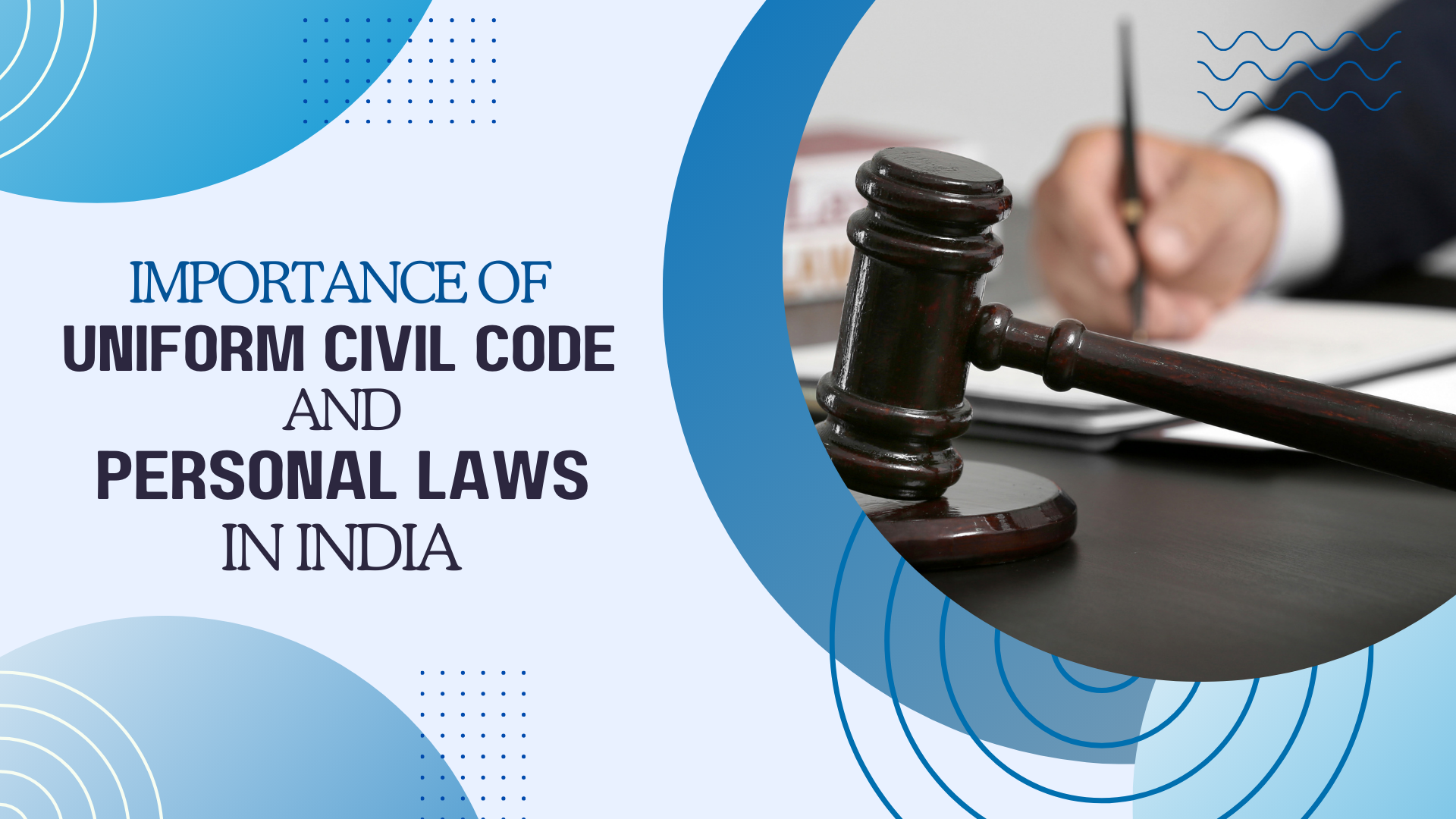Home » What is the Importance of Uniform Civil Code and Personal Laws in India?

India, the land of diverse cultures, languages, and traditions, is a melting pot of beliefs and practices. This diversity is both a source of strength and a challenge, especially when it comes to matters of personal laws and civil codes. In a nation where unity coexists with diversity, the need for a Uniform Civil Code (UCC) alongside personal laws becomes imperative. Let’s delve into why this is crucial for India’s socio-cultural fabric.
India, despite its modern outlook, continues to grapple with a complex web of personal laws based on religion, ethnicity, and community. These laws govern various aspects of individuals’ lives such as marriage, divorce, inheritance, and adoption. The diversity in personal laws has often led to disparities and inconsistencies, perpetuating inequality and injustice.
Legal Systems at the Nexus of Law and Society
1. Equality and Justice for All
The foremost argument in favor of a Uniform Civil Code is rooted in the principles of equality and justice enshrined in the Indian Constitution. Article 44 of the Constitution directs the state to strive towards securing a UCC for its citizens. A uniform set of laws would ensure equal treatment irrespective of religion, caste, or gender, fostering a more just society.
2. Women’s Rights and Empowerment
One of the most compelling reasons for implementing a UCC is to safeguard and advance women’s rights. Personal laws, particularly in matters of marriage, divorce, and inheritance, often disadvantage women, subjecting them to discrimination and exploitation. A uniform code would provide women with equal rights and opportunities, empowering them to live with dignity and autonomy.
Combating Sexual Harassment at the Workplace: A Call for Change
3. Harmonizing Legal Frameworks
The coexistence of multiple personal laws alongside a secular legal system creates confusion and complexity. A Uniform Civil Code would harmonize the legal landscape, simplifying procedures and promoting legal certainty. This would not only streamline the judicial process but also enhance access to justice for all citizens, irrespective of their background.
4. Promoting National Integration
India’s unity in diversity is its greatest asset, but it also poses challenges in fostering national integration. Fragmented legal systems based on religion and ethnicity can deepen societal divides. A Uniform Civil Code would transcend these divisions, promoting a sense of common identity and belonging among citizens, irrespective of their cultural or religious affiliations.
5. Modernization and Progress
In today’s fast-paced world, where social norms and values are evolving rapidly, archaic personal laws can act as barriers to progress. A Uniform Civil Code would reflect contemporary societal norms and aspirations, aligning legal frameworks with the ethos of a modern, progressive nation. It would facilitate social reforms and pave the way for a more inclusive and equitable society.
Implementing a Uniform Civil Code is not without its challenges. It requires careful consideration of diverse socio-cultural contexts and sensitivities. There are concerns regarding preserving cultural diversity while ensuring legal uniformity. Moreover, any reform in this regard must be accompanied by robust mechanisms for consultation and consensus-building among stakeholders.
Conclusion –
In conclusion, the need for a Uniform Civil Code alongside personal laws in India cannot be overstated. It is not about imposing uniformity but about upholding the principles of equality, justice, and inclusivity enshrined in the Constitution. A UCC would not only ensure equal rights for all citizens but also promote national integration and social cohesion. As India marches towards a brighter future, embracing unity in diversity through a Uniform Civil Code is not just a necessity but a moral imperative.
Are you passionate about pursuing a degree in law and want to make a career in legal field? Think no more! Choose Lingaya’s Vidyapeeth which is one of the leading Top Law Colleges in Delhi NCR. Immerse yourself in a dynamic academic environment led by esteemed faculty who are passionate about shaping future legal minds. With innovative curriculum, state-of-the-art facilities, and hands-on internships, Lingaya’s Vidyapeeth will definitely give you a boost in your legal career. Enroll now!
From
Shilpa Sharma
Assistant Professor
School of Law
Lingaya’s Vidyapeeth
Best LLB Colleges in Delhi NCR
RECENT POSTS
CATEGORIES
TAGS
Agriculture Agriculture future AI Architecture artificial intelligence BA English BA Psychology BTech Engineering Business management career Career-Specific Education career guide Career Opportunities career option career scope Civil engineering commerce and management Computer Science Computer science engineering Data science degree education Engineering engineering college Engineering students English Literature english program Exam tips Fashion Design Fashion design course Higher Education Journalism journalism and mass communication law Law career Machine Learning MA Psychology Master degree mathematics MBA Mechanical Engineering Pharmacy Psychology Research and Development students
University Address: Nachauli, Jasana Road, Faridabad, Haryana
Toll Free: 1800-120-4613
Mobile : 8447744303 | 8447744304 | 8447744306 | 8447744309
Address: C-72, Second Floor, Shivalik, Near Malviya Nagar,
Above HDFC Bank, New Delhi 110017
Ph.No. - 011-46570515 / 45138169 / 41755703 / +91-7303152412
Jagmani Kutir, Ground Floor, Road No-1, Rajeev Nagar,
Near Darbar Marriage Hall, Patna-800024, Bihar
Contact No: 9818352069/8130120095
Mail: [email protected]
Copyrights © 1998 - 2025 Lingaya's Vidyapeeth (Deemed To Be University). All rights reserved.
It is important to note that the following email IDs and domains are fraudulent and do not belong to our university.
LV only conducts physical/online verification of any document related to examination on the following email id: